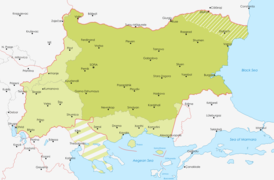Bulgarian irredentism

Bulgarian irredentismis a term to identify the territory associated with a historical national state and a modernBulgarianirredentistnationalistmovement in the 19th and 20th centuries, which would include most ofMacedonia,ThraceandMoesia.
History
[edit]The larger proposed Bulgarian state was suggested under theTreaty of San Stefanoin 1878.
The issue of irredentism and nationalism gained greater prominence after the Treaty of San Stefano. It established a Principality of Bulgaria, with territory including most ofMoesia- the plain between theDanubeand theBalkan mountainsrange (Stara Planina), the regions ofSofia,Pirot,andVranjein theMorava Valley,Thrace-Northern Thrace,parts ofEastern Thrace,and nearly all ofMacedonia.This treaty laid grounds for much of the later claims for a Greater Bulgaria. However, the Treaty of San Stefano was a preliminary one, and the borders of the newly created Bulgaria were established in theTreaty of Berlin.It saw the previous territory divided in three – thePrincipality of Bulgaria,the autonomous province ofEastern Rumelia,and Macedonia, which remained under Ottoman control.
In the early 20th century, control over Macedonia was a key point of contention between Ottoman Empire, Bulgaria,Greece,andSerbiawho fought both theFirst Balkan Warof 1912–1913 and theSecond Balkan Warof 1913. The area was further fought over during theMacedonian Campaign of World War I(1915–1918).
Just before enteringWorld War II,Bulgaria had peacefully secured the return ofSouthern DobrujafromRomaniain theTreaty of Craiova.[1]DuringWorld War II,some of the territories in question were briefly added to Bulgaria byNazi Germany,as a reward to Bulgaria, which had fought with Germany as one of theAxis powers.It was granted territory inGreece,namelyEastern Macedoniaand parts ofWestern Thrace,as well asYugoslavMacedonia (Vardar Macedonia).[2]With the exception of Southern Dobruja, these concessions were reversed with the Allied victory (i.e. at theParis Peace Conferenceof 1947).
Gallery
[edit]-
Bulgarian Exarchate(1870–1913).
-
Bulgaria according to theConstantinople Conferenceof 1876.
-
Treaty of San Stefano(1878) showing the boundaries ofBulgaria.
-
Bulgarian campaigns during World War I(1915-1918).
-
Bulgaria during World War II(1941-1944).
See also
[edit]- Bulgarian National Awakening
- Bulgarian Millet
- Bulgarian unification
- Bulgarian Declaration of Independence
References
[edit]- ^"Bulgaria During World War II".Archived fromthe originalon 2007-02-03.Retrieved2007-02-12.
- ^Bulgaria During the Second World War, Marshall Lee Miller, Stanford University Press, 1975,ISBN0804708703,p. 128.





